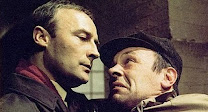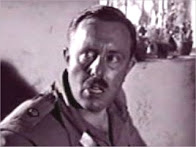Reflections
on “Callan” (TV series 1967-1972)
Created
by James Mitchell
Starring
Edward Woodward, Russell Hunter,
Anthony
Valentine and Patrick Mower
“Callan” takes place in
the Cold War era and this series portrays with quite overwhelming realism the
grimy, dirty and often painful business of undercover operations intended to
ensure national security.
According to the premise
of this show, assuring the safety of the nation when normal legal and
diplomatic channels have failed, can involve underhand and amoral activities
such as fraud, theft, blackmail and murder. Authorities working in a group referred
to as The Section, under the command of a man whose title is Hunter, have to be
cold, calculating and somewhat amoral themselves as they make frequent use of
unprincipled and unscrupulous means toward the pragmatic end of protecting the
nation’s security, and of course it is implied that every developed nation will
have such a service.
To help achieve their
end, these authorities are willing to turn to less respectable or honourable
members of society who may have developed skills and talents The Section might
find useful. Of course, they also recruit “professional” agents such as Meres
and Cross but they appear to be chosen on the basis of their devotion and ambition,
and perhaps their traits of psychopathy. They will tend to follow orders
unquestioningly and kill with little reflection or consideration.
David Callan, as we know
him - this is not his original name - is quite different though at first glance
he may appear to fit the authorities’ criteria. He has developed skills and
cunning that allow him to survive in an unpleasant and dangerous world.
Having lost both parents
in the London Blitz, Callan displayed the intelligence, determination and
spirit required to survive and become self-reliant, but he has retained
humanity, curiosity and a sense of fairness. Doubtless lacking direction and
purpose, Callan joined the army, serving in Malaysia, and his energy, spirit
and survival instincts were channelled to help him become a highly effective
soldier both in terms of tactics and his ability to kill, if required. He has
problems with authority and, though he saved an officer’s life, he also argued
and fought with others of higher rank, perhaps reflecting independent thought,
humanity and intelligence.
After leaving the army, undoubtedly
unable to settle for a prosaic and mundane career in book-keeping, and perhaps
missing the visceral excitement of military sorties and combat, Callan resorts
to a life of crime, though he is rather unsuccessful and spends two years in
prison.
It is on his release that
The Section approaches him, clearly wishing to take advantage of his skills and
character flaws for their own ends.
However, Callan brings not
just military fighting and survival skills, but also his fundamental humanity,
independence and questioning intelligence. He asks questions and seeks to
understand when he is expected to obey orders. He may even doubt the wisdom of
his instructions and follow his own instincts and common sense, though
generally he achieves the mission set to him, but on his own terms and having
satisfied his own desire to understand, even if he doesn’t always like or
approve of the result, reflecting a moral dilemma.
Rather like many who
fulfil roles they don’t particularly like in society, he grudgingly recognises
the need for what he does and his own talents and abilities within that
context, but he can rue certain decisions and actions that have led to this
juncture in his life and the fact he feels trapped as he cannot simply change
direction since his departure would have security implications, possibly
threatening his own survival.
What makes “Callan” such
gripping viewing is the existential nature of the world in which these agents
work, with little consideration of moral niceties, and the conflict, inner and
outer, Callan brings to the piece as he wrestles with his sense of duty and
purpose, and the nagging and questioning humanity he demonstrates as he carries
out his duties.
Callan’s one good friend
is Lonely, a skilled small-time thief, forger and informer, who regularly helps
Callan in the course of his work without fully knowing Callan’s background or
situation. In circumstances that rather mirror his own relationship with his
superiors, Callan regularly applies bullying tactics in his relationship with
Lonely, though he often shows regret at having to resort to such methods which
he uses to ensure control of Lonely and to maintain his compliance, but also to
protect his friend by keeping him out of the loop and open to pressure and
threat.
Another reason for the
show’s success is the realism of the stories and characters themselves. Made at
the height of the Cold War, many of the storylines and settings were vaguely
familiar to audiences and it was intriguing to see headlines brought to life in
believable, if sometimes grimy and painful, plots. Characters were always well
fleshed out and drawn and it was rarely a simple case of “goodies versus
baddies” as all had reasons, valid or otherwise, for their actions and we as an
audience were invited to share in the complexity, pain and consequences of the
situation, and sympathised with Callan as he had to act as judge and occasionally
executioner, often contradicting his orders, and as he paid a heavy personal
price in terms of relationships and personal life for his efforts.
This was not the first
time in cinema and TV history that those of dubious background or character
were used for the purpose of national security. “The Dirty Dozen” was released
in 1967 and there had been numerous Cold War spy films with characters whose
motives and backgrounds were a little murky, but I think that “Callan” was the
first to properly delve into the murky existential waters of the Cold War on TV
and fully explore characters, motives and especially consequences for all those
involved. In so doing, a unique and almost melancholic atmosphere and mood were
created, summed up beautifully by the opening titles and the haunting theme
tune, and I think the creation of that atmosphere and indeed the premise itself
played a huge part in the success of the series.
Of course, this premise
has been used many times since, in a number of variations of the theme, notably
in Luc Besson’s “Nikita” which itself spawned a TV series and a Hollywood
remake.
All who wrote, directed,
produced and acted in the four series, film and TV film deserve much praise,
but special credit must go to Edward Woodward and Russell Hunter who created
indelible characters still worth seeking out and watching more than fifty years
after they first played them.
My thanks for taking the
time to read this article. I hope you found it of some value.
Stuart Fernie (stuartfernie@yahoo.co.uk)


















